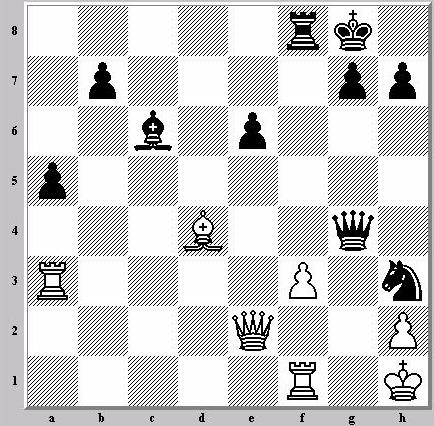I learned to play chess when I was about 14 years old and have played actively until early 2008.
My first club was O & O in Kampen, when in 1974 I became a student in Utrecht I joined Utstud which later renamed itself to Paul Keres.
In this club I was a committee member for several years as well.
About ten years later I started to play for DD in Den Haag, until I moved to England where I joined the Chester YMCA Chess club.
Also, when I was a student, I started to develop my own chess program which competed many times in the Dutch National Championship organised by the CSVN.
The best result my program obtained was a shared second place in 1983. It also competed twice (Cologne 1986 and Edmonton 1989) in the World Championship organised by the ICCA (now ICGA).
In the Netherlands there is an annual national championship for company teams. I won this title three times: once as a member of the University of Utrecht team, and twice as a member of the Shell team.
The game I am most proud of
This game was played in 1995 in the internal competition of of DD. I was playing black and after 41 moves the game was adjourned in the following position

With some pawns for the exchange and enormous pressure on f3 I felt quite optimistic although I had not been able to find a forced win. The game continued
42. Rc3 Bd5
Of course I could have gone into an endgame by 42. ... Qxd4 43. Rxc6 bxc6 44. Qxe6† Kh8 45. Qxh3 but what is white to do now?
Black threatens Ng5 and white's position should quickly collapse.
43. Qe5! Rxf3
44. Rc8† Rf8†
45. Qxd5
This was what white had anticipated when he played 43. Qe5 allowing the capture on f3.
Obviously the queen cannot be taken because of mate on f8. I think white had now expected 45. ... Rxc8? 46. Qxb7 Rf8 47. Rxf8† Kxf8 48. Qc8† with perpetual check, but...
45. ... Nf2†!!
If the knight is taken by the bishop black can simply take the queen as there is no longer a mate on f8. So
46. Rxf2 Rxc8
and now there is a double threat: Rc1† and exd5. White still tried
47. Rg2 Qd1†
and here white resigned: 48. Rg1 Qxg1† leaves him with an hopeless ending.
Another memorable game was with Richard Dinely of Wrexham (North Wales)
my BCF grading
chess words in Dutch, English and Russian
Back to my home page

